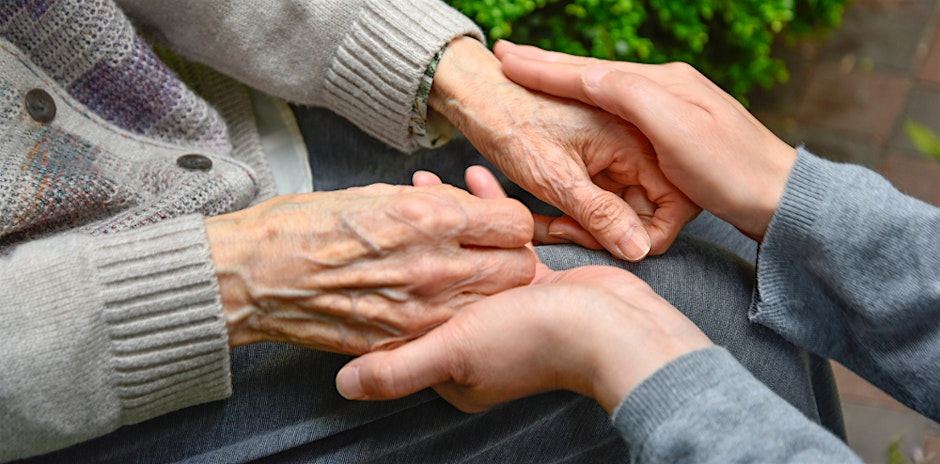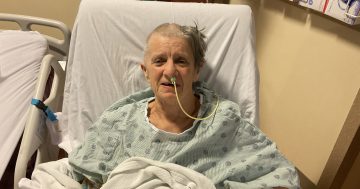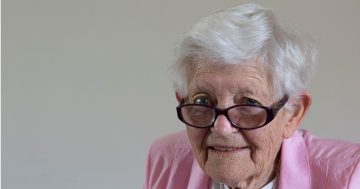
Caring for older relatives with mental or physical conditions is demanding and draining. Photo: Wollongong Library.
I’ve always admired and respected people who become carers for someone who can’t look after themselves.
I sympathised and thought I understood what they were going through. However, it’s only since I found myself in a carer’s role, 24 hours a day, seven days a week, that I realised I had merely paid lip service to the actual selflessness, patience and true dedication that such a role demands.
Back in August 2023, I wrote a story about a Federal Government inquiry into recognition for unpaid carers. From what I can see, not much has changed since that inquiry handed down its report and 22 recommendations in July 2024.
Fast forward to September 2025 and I’m one of those carers. It’s only through this experience that I have a much greater appreciation of what carers go through every day and why they so desperately need more services and support.
At 82 and despite increasing symptoms of Alzheimer’s disease, Mum had been able to live on her own in her small unit.
Granted, my sister and I have had to play a much greater role in her day-to-day life to ensure she remains safe and well – and takes her three-times-daily medication.
I’ve become increasingly familiar with the vagaries and confusion of My Aged Care and was gradually organising services to help her remain independent in her home.
She no longer drives, but she was physically well for her age and could walk to the nearby supermarket to get the little things she needed.
We were thrilled to see her rediscover her love of gardening and admired her growing balcony garden.
But a recent trip to restock that garden ended in a fall and broken ankle. In the blink of an eye, her life (and ours) turned upside down.
(By the way, Dapto Urgent Care Centre does not operate an x-ray service on weekends. Just so you know before you get there).
We could not fault the service she received at Wollongong Hospital’s Emergency Department. We may have been “lucky” to arrive on a relatively quiet Sunday afternoon, but she was triaged, x-rayed and in an ED bed within a couple of hours.
The bad news was that she had broken her ankle in two places. The worse news was that she could not put any weight on the foot for six weeks.
Obviously she would be unable to look after herself for at least that time. As the husband and I live in a village built for ageing and those with a disability, and we had a spare bedroom, it made sense for her to move in with us.
It sounded like a simple solution but I didn’t realise at the time what a huge undertaking it was going to be.
She couldn’t leave the hospital until staff were confident she could get out of bed and manage to manoeuvre on her one good leg. Plus, we had to have in place the appropriate equipment to get her out of bed, to the toilet and shower.
My sister and I, both trying to keep up our paid work, raced around to hire equipment and endeavour to get in-home services in place.
All this time, Mum remained in hospital being moved from pillar to post, first within the ED and then onto a ward. Her confusion became worse with every move. She became more and more erratic, emotional and even aggressive with staff. Her messages and phone calls to us – at all times of the day and night – became more and more disturbing. PLEASE COME AND GET ME. I WANT TO COME HOME.
The staff we dealt with on the ward were beautiful, caring souls, but after four days we felt we couldn’t leave Mum in hospital any longer – not that she was poorly treated, far from it, but we were increasingly concerned about her mental state. And ours for that matter.
It’s now been a week since our unexpected guest came to stay. Before this happened I was slowly adjusting to losing the mother I loved due to the horrible ravages of Alzheimer’s, but having to take on the physical demands of caring for her every need is almost impossible to process.
I am exhausted, sleep-deprived and constantly emotional. I feel guilty for neglecting my work, I feel guilty for taking out my emotions on my husband and worse, getting angry with my mother when it’s no fault of her making.
The after-home care service we ended up getting through Mum’s Commonwealth Home Support Program consists of a carer coming in for 30 minutes four days a week to shower her. So far we’ve had four carers – four new people dealing with a woman who sometimes can’t remember how she ended up with a cast on her leg.
She is one of the “lucky ones” – she has been assessed and approved for a Home Care package. But approval doesn’t mean delivery. She is one of the roughly 87,000 older Australians who has ticked all the boxes for higher level in-home services – aimed at keeping them independent and out of hospital – but who is still waiting for those services to start.
Like all children of ageing parents, we would love to see Mum continue to live in her home of 15 years, as she wants to do. But she can’t do it on her own. We can’t let her do it without our help and we can’t do it without help.
None of this will come as any surprise to carers, the aged care community and those who are desperately trying to provide services to the elderly, sick and disabled.
I’d like to think it also doesn’t come as any surprise to those who have the power to make real and immediate changes to the carer system, but I suspect that unless those people have had the responsibility of caring for sick parents or children, they really don’t understand how desperate the need is.


















